More than two dozen websites and two days of speaking a month promoting food safety have helped this litigator become #1 in his field.
No attorney in the nation files more lawsuits for injuries arising from food-borne illnesses than Bill Marler. He first gained national prominence in that field when he won a $15.6 million settlement for the most seriously injured victim of an outbreak of E.coli at Jack in the Box restaurants in 1993. After that, referrals from attorneys with food-borne illness cases across the country started flowing into his then-solo law office in Seattle.
In 1998, Marler teamed up with several other lawyers, including Bruce Clark, who had defended Jack in the Box in the E. coli litigation, to form Marler Clark. The firm, which now has five attorneys, bills itself on its many web sites as “the nation’s foremost law firm with a practice dedicated to representing victims of food poisoning.” One of the main reasons that Marler Clark has vaulted to the top of that rich personal-injury niche is, paradoxically, the prominent role that he and his firm have played in promoting food safety, Marler says.
“I have become more than just a guy who sues companies,” he explains. “I spend a lot of time at food safety conferences. I travel all over the world speaking about food safety. I am very passionate about my cases and also about the advocacy stuff I do. I think that’s why I have been able to be lead counsel in most – in fact, I would say almost all – of the major food-borne illness outbreaks that have happened since 1998.”
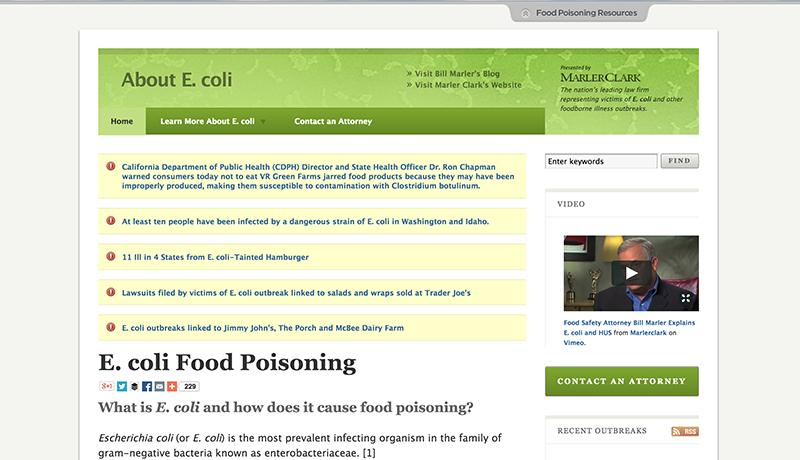
Informational Websites Help Keep Firm in Forefront
One of the ways that Marler Clark keeps itself at the center of the national discussion about food safety is through a sprawling network of more than two dozen web sites, many of which are devoted to a specific food-borne illness. The firm maintains web sites called About Ecoli, About Hepatitis, and About Hemolytic Uremic Syndrome, for instance, and others about listeria, salmonella and other illness that are usually caused by contaminated food. Each of those web sites includes a detailed description of the illness, its causes and symptoms, summaries of related cases that the firm has handled, and the latest developments about the illness.
Seven of those illnesses generate such a steady stream of news that they warrant their own Marler Clark blog, including the Listeria Blog, the Shigella Blog, and the Salmonella Blog. And Marler Clark has created colorful, attractively designed, one-page fact sheets on half a dozen of the most common afflictions, intended for distribution to members of the public. The sheets include contact information for the firm and a link to the web site dedicated to that particular illness.
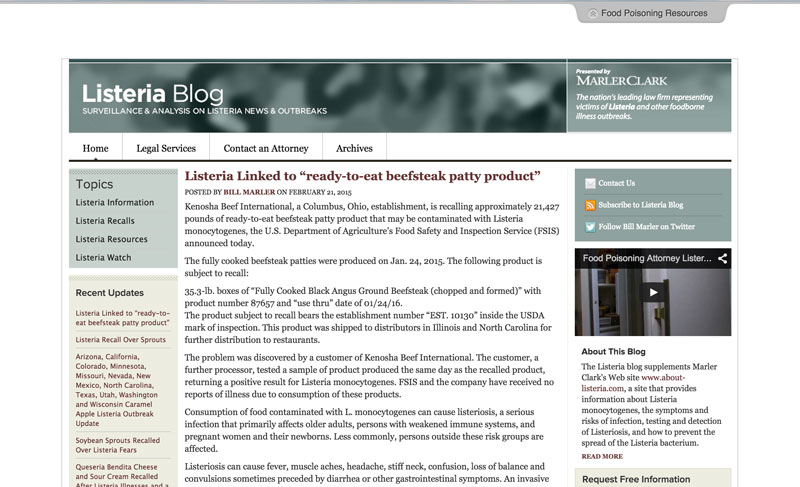
In addition, the firm has two catch-all sites about food safety, called Food Poison Journal and Food Safety News, a site about how to avoid getting sick at fairs and petting zoos [www.fair-safety.com], and yet another site about the hazards of raw milk. For consumers, reporters, or regulators seeking information about outbreaks in particular months or years, or states or cities, or stemming from specific food products, restaurants or stores, the firm has a searchable database that provides summaries of significant food and water related outbreaks that have occurred since 1984. [www.outbreakdatabase.com] And Marler has a widely followed, very busy blog of his own, Marler Blog, where he has published over 5,000 blog posts in the 10 years since he launched it.
All of those web sites are in addition to the law firm’s site [www.marlerclark.com], which is the oldest of the bunch, dating back to the firm’s genesis in 1998. It still serves as Marler Clark’s online brochure, and a gateway to all of the other sites. But as the Internet has evolved, Marler says, it became apparent that consumers looking for information online are far more likely to land directly on pages dedicated to a specific topic rather than reach those pages by way of the firm’s virtual front door. In response, the firm created the network of interlinked, stand-alone web sites. They ensure that anyone searching the Internet for information about any food-borne illness will end up in short order on a Marler Clark web site.
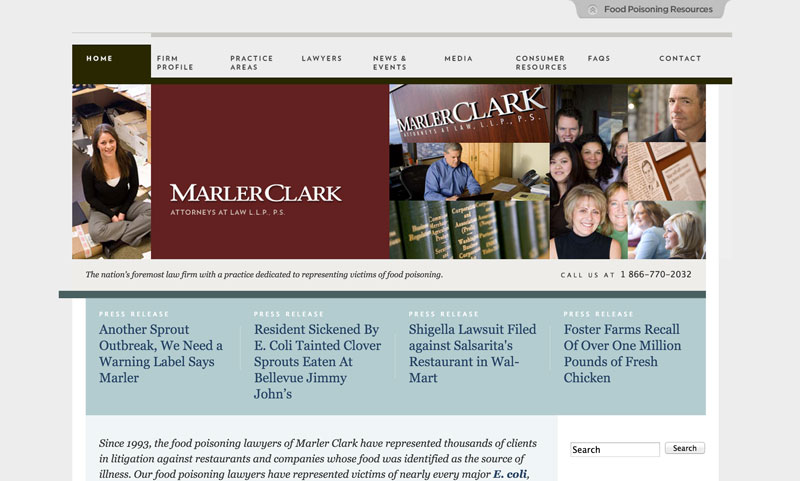
The sites are not just useful to consumers who got sick from eating contaminated food and are looking for a lawyer to file a suit on their behalf. They also are helpful to consumers who want to avoid getting sick, and to food businesses seeking to prevent the spread of food-borne illnesses to their customers.
That is a point that the firm makes in a tag line at the bottom of each fact sheet: “This brochure is part of our on-going effort to end the need for salmonella (or listeria or shigella, etc.) litigation in this country.” Similar references to prevention of food-borne illnesses appear in the descriptions of most of the firm’s other web sites and blogs. While that would suggest that Marler Clark wants to put itself out of business, Marler insists the sentiment is sincere. He is convinced that the verdicts and settlements that the firm has won, and more generally the educational outreach that he has done, has in fact helped curb outbreaks.
Reaching Out to Adversaries
“For the first decade of my practice, probably 90 percent of my firm’s revenue was E. coli cases linked to hamburger. That has fallen to nearly nothing because the red meat industry has done a remarkable job of cleaning up its act,” says Marler. He hasn’t been shy about giving the industry due credit for that.
“I was the keynote speaker at the National Meat Association conference in early 2012. It was the 20th anniversary of the Jack in the Box case. My talk was about how far the meat industry has really come,” says Marler. He reiterated that point in his 5,000th blog post. “I called it Ode to the Beef Industry. I thought it was appropriate to tell them that they had done a good job,” he says.
The speeches to food production and retail trade associations are managed by a consulting firm called Outbreak Inc., that was launched several years ago by two Marler Clark attorneys who had previously worked as counsel for food-related business. “We tend not to approach these things with the knee-jerk reaction that corporations are bad, that they’re intentionally trying to poison people,” explained Denis Stearns, one of the founding partners, in an interview published on the firm’s web site. “We use Outbreak as a way to stay in that side of it.”
That does not mean attorneys with the firm work for industry groups, says Marler, who personally makes most of the appearances. “It means that I basically go around to conferences giving speeches for free about how to avoid getting sued and how to make food safety a priority. I have also worked on food safety legislation on a national level,” he says. “I would say I average a couple of days a month giving speeches around the country.”
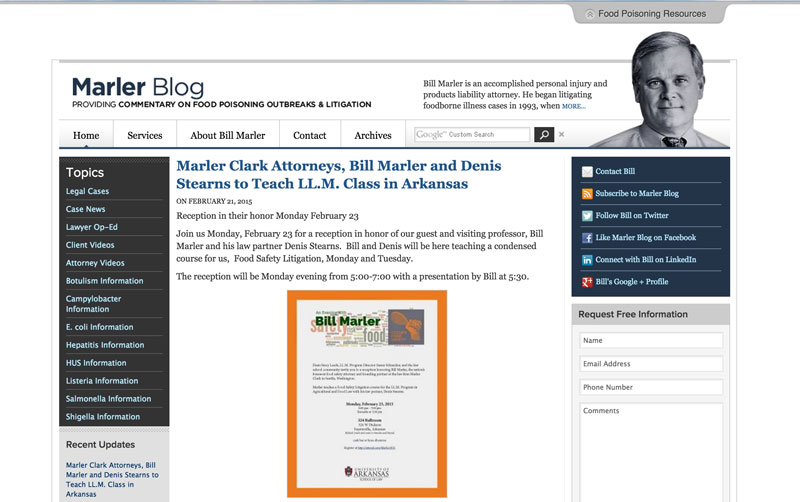
Using His Blog and Twitter for Food Safety Advocacy Work
His blog has evolved into his main platform for advocating for changes in laws and regulations concerning food safety, Marler says. “At first, it was a little more cut and paste. I would take a paragraph or two out of some news article and then I would say something about it. I still do that a little bit, if something piques my interest and I want to say something about it. But in recent years, I have used my blog a lot more to push policies and to push issues out there for reporters to deal with.”
His blog has effectively served that purpose from time to time. For example, during the height of the controversy over attempts by officials in Maine to quarantine a nurse who had worked with Ebola patients in West Africa but had no symptoms of the disease, he saw a news story late one evening stating that a restaurant worker in Maine had tested positive for hepatitis A, a serious illness that is commonly spread by food service workers.
“The article said the health department had put out a warning that a restaurant worker was contagious with hepatitis A, but the department did not give the name of the restaurant or even the city where it was located,” Marler says. “I thought, isn’t Maine the place where they are trying to quarantine the woman who doesn’t have Ebola. Certainly hepatitis A kills more people every year in the United States than Ebola has.”
He noted the irony in a blog post that he published that evening. He posted a note about the article and a link on his Twitter feed, which has nearly 10,000 followers and where he has posted over 28,000 tweets in the six years since he started using the service. “The next morning, I had a bunch of e-mails from reporters in Maine who wanted me to comment on the situation,” he says.
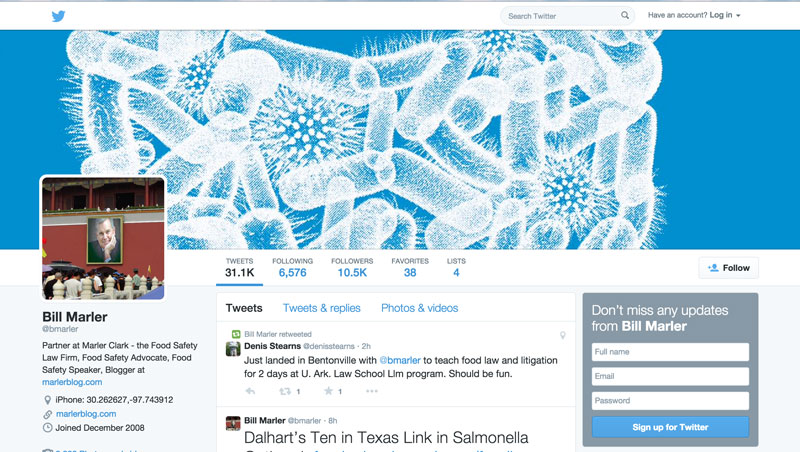
His prolific activity on social media is yet another reason why he has come to dominate his field, he says, though he can’t quantify the impact. “I think I have found a voice that works, and because I am paying attention to a lot of the legal issues and medical issues and public policy issues, and because I have been around long enough, I think sometimes people do pay attention to what I have to say.”
He adds, referring to the firm’s massive presence overall on the Internet and in social media, “I don’t really pay attention to traffic. I probably should, but we’re really busy, so I don’t spend a lot of time worrying that I’m not going to get another case. I suppose if we were less successful, I would be more focused on how many people click through and stuff like that. But I haven’t followed that in a long, long time.”
Safety Advocacy as a Marketing Strategy
Marler acknowledges that all his talk about wanting to promote food safety could be seen by some as a cynical marketing gimmick by a personal injury lawyer who laughs all the way to the bank when a new outbreak happens.
“If I said all that [about food safety]but I was just suing companies, I could see why people might think that,” he says. “But I have invested millions of dollars of my time over the years traveling the world talking about food safety. Is that marketing or is that because I want to see fewer people getting sick? I tend to think it’s the latter because I have seen the bad things that food-borne illnesses can do and I really want fewer people to get sick. Certainly a lot less kids are getting E. coli from hamburger these days than when I started out. And think I get some credit for that.”
That may have cost him one whole category of cases, but his firm has benefitted in other ways, he says. The work on promoting food safety is one of the main reasons why Marler Clark has become the go-to firm for food-borne illness cases nationwide.
“There are a lot of lawyers out there who do good trial work, and there are a couple of other lawyers out there who have developed websites and have promoted themselves as food safety lawyers. But they are not passionate about food safety. They haven’t testified in front of Congress. They haven’t pushed for legislation. They don’t spend time speaking on the topic. When I do that, is it for marketing purposes, or is it because I am passionate about this stuff? When you can’t tell the difference, I think that’s probably successful marketing.”
Marler adds, “The industry and government have done a great job on E. coli and hamburger, and that aspect of my business is nonexistent, which is a good thing. But we’ve got a whole lot of other things to work on, so it’s not like I’m completely out of business yet. It’s like the proverbial Dutch boy sticking his finger in the dike. You plug a hole in the red meat industry and it pops up somewhere else with spinach or lettuce or chicken. There have been some pretty remarkable improvements, but there’s always work to do, unfortunately.”



